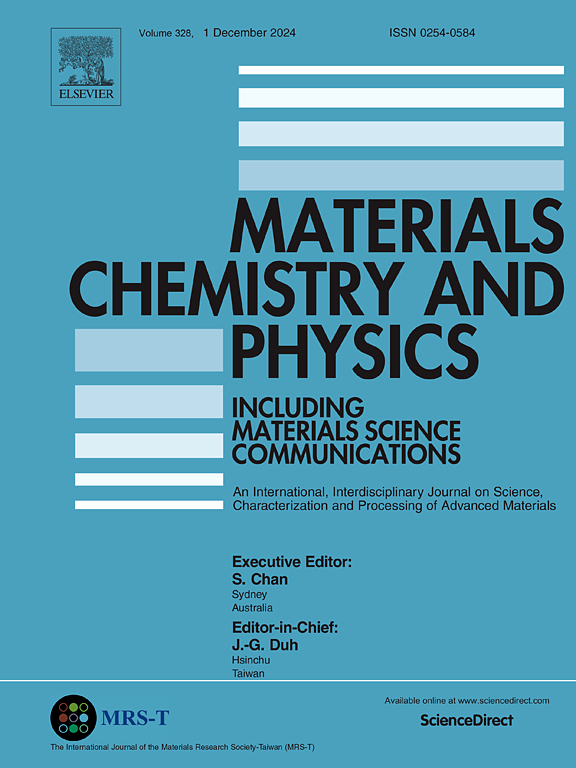酸性环境中螺栓腐蚀行为和失效机理的实验研究
IF 4.3
3区 材料科学
Q2 MATERIALS SCIENCE, MULTIDISCIPLINARY
引用次数: 0
摘要
研究各种金属螺栓在酸性环境中的耐腐蚀性和失效过程。对普通螺栓、浸锌螺栓和渗锌螺栓进行了腐蚀对比实验。分析了这三种螺栓的腐蚀行为和机理。结果表明,在酸性环境中,普通螺栓的耐腐蚀性能明显较差,浸锌螺栓次之,而浸锌螺栓的耐腐蚀性能达到顶峰。这些螺栓的瞬时腐蚀速率常数分别为 0.25026、-0.19605 和 -0.06209。腐蚀 100 天后,三种螺栓的机械性能下降,屈服强度分别下降了 6.50 %、4.63 % 和 2.85 %,抗拉强度分别下降了 6.37 %、3.99 % 和 1.45 %,伸长率分别下降了 15.85 %、12.20 % 和 7.97 %。随着腐蚀的加剧,普通螺栓的拉伸断裂行为从延性断裂过渡到延脆混合断裂,浸锌和渗锌螺栓的拉伸断裂行为仍为延性断裂。普通螺栓的腐蚀过程遵循溶解-破坏机理,浸锌螺栓遵循溶解-破坏-渗透机理,而渗锌螺栓遵循溶解-转化机理。本文章由计算机程序翻译,如有差异,请以英文原文为准。
Experimental study on corrosion behavior and failure mechanism of bolts in acidic environment
To investigate the corrosion resistance and failure process of various metal bolts within acidic environment. The comparative corrosion experiment was conducted on ordinary, zinc-immersed, and zinc-infiltrated bolts. The corrosion behavior and mechanism were analyzed in these three types of bolts. The results showed that within an acidic milieu, the corrosion resistance of ordinary bolt is notably inferior, succeeded by zinc-immersed bolts, and the zenith of corrosion resistance is observed in zinc-infiltrated bolts. The instantaneous corrosion rate constants for these bolts are found to be 0.25026, −0.19605, and −0.06209, respectively. After 100 days of corrosion, the degradation in mechanical properties for the three bolts manifested as the yield strength decreased by 6.50 %, 4.63 %, and 2.85 %, respectively, and the tensile strength decreased by 6.37 %, 3.99 %, and 1.45 %, respectively, and the elongation decreased by 15.85 %, 12.20 %, and 7.97 %, respectively. As the corrosion advanced, the tensile fracture behavior of ordinary bolt transitions from ductile fracture to ductile-brittle hybrid fracture, the tensile fracture behavior of zinc-immersed and zinc-infiltrated bolts remains ductile fracture. The corrosion process for the ordinary bolt follows dissolution-destruction mechanism, the zinc-immersed bolt follows dissolution-destruction-penetration mechanism, and the zinc-infiltrated bolt follows dissolution-transformation mechanism.
求助全文
通过发布文献求助,成功后即可免费获取论文全文。
去求助
来源期刊

Materials Chemistry and Physics
工程技术-材料科学:综合
CiteScore
8.70
自引率
4.30%
发文量
1515
审稿时长
69 days
期刊介绍:
Materials Chemistry and Physics is devoted to short communications, full-length research papers and feature articles on interrelationships among structure, properties, processing and performance of materials. The Editors welcome manuscripts on thin films, surface and interface science, materials degradation and reliability, metallurgy, semiconductors and optoelectronic materials, fine ceramics, magnetics, superconductors, specialty polymers, nano-materials and composite materials.
 求助内容:
求助内容: 应助结果提醒方式:
应助结果提醒方式:


